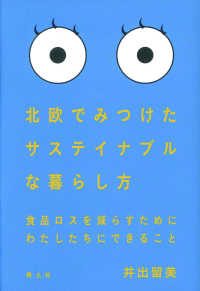- ホーム
- > 洋書
- > 英文書
- > Politics / International Relations
基本説明
The notion of being freeborn republicans bound the eighteenth-century Dutch together and constituted a significant part of their sense of national identity. This book explores the many varieties of eighteenth-century Dutch republicanism from a number of different methodological perspectives.
Full Description
The notion of being freeborn republicans bound the eighteenth-century Dutch together and constituted a significant part of their sense of national identity. Yet beneath this general label, many fundamental differences existed. Republicanism could stand for anti-monarchism, but it could also be a moral doctrine emphasizing the importance of the exercise of virtue, or refer to a certain way of life. During the revolutionary years of the late eighteenth century, it came to mean the permanent and active sovereignty of the people. This book explores the many varieties of eighteenth-century Dutch republicanism from a number of different methodological perspectives. It thereby significantly contributes to our understanding of a crucial period in the development of Dutch political thought.
Contents
Acknowledgements
1. Introduction: "The First Republic of Europe"
2. Anti-Monarchism in Early Modern Dutch Political Thought
3. Early Eighteenth-Century Political Languages
4. Polite Republicanism and the Problem of Decline
5. Republican Readings of Montesquieu: The Esprit des Lois in the Dutch Republic
6. Revolution, Counterrevolution and the Stadholderate, 1780-1795
7. The Concept of Liberty in the Dutch Republic, 1780-1787
8. Contemporary Reactions to Patriot Political Discourse
9. Dutch Constitutionalism at the End of the Eighteenth Century
10. The End of Republican Politics
Bibliography
Index






